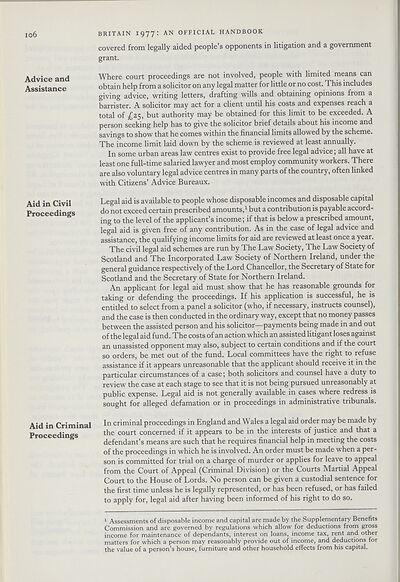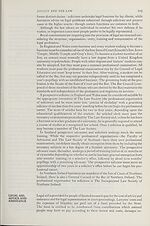Britain: An official handbook > 1977
(124)
Download files
Complete book:
Individual page:
Thumbnail gallery: Grid view | List view

io6
Advice and
Assistance
Aid in Civil
Proceedings
Aid in Criminal
Proceedings
BRITAIN 1977: AN OFFICIAL HANDBOOK
covered from legally aided people’s opponents in litigation and a government
grant.
Where court proceedings are not involved, people with limited means can
obtain help from a solicitor on any legal matter for little or no cost. This includes
giving advice, writing letters, drafting wills and obtaining opinions from a
barrister. A solicitor may act for a client until his costs and expenses reach a
total of £25, but authority may be obtained for this limit to be exceeded. A
person seeking help has to give the solicitor brief details about his income and
savings to show that he comes within the financial limits allowed by the scheme.
The income limit laid down by the scheme is reviewed at least annually.
In some urban areas law centres exist to provide free legal advice; all have at
least one full-time salaried lawyer and most employ community workers. There
are also voluntary legal advice centres in many parts of the country, often linked
with Citizens’ Advice Bureaux.
Legal aid is available to people whose disposable incomes and disposable capital
do not exceed certain prescribed amounts,1 but a contribution is payable accord¬
ing to the level of the applicant’s income; if that is below a prescribed amount,
legal aid is given free of any contribution. As in the case of legal advice and
assistance, the qualifying income limits for aid are reviewed at least once a year.
The civil legal aid schemes are run by The Law Society, The Law Society of
Scotland and The Incorporated Law Society of Northern Ireland, under the
general guidance respectively of the Lord Chancellor, the Secretary of State for
Scotland and the Secretary of State for Northern Ireland.
An applicant for legal aid must show that he has reasonable grounds for
taking or defending the proceedings. If his application is successful, he is
entitled to select from a panel a solicitor (who, if necessary, instructs counsel),
and the case is then conducted in the ordinary way, except that no money passes
between the assisted person and his solicitor—payments being made in and out
of the legal aid fund. The costs of an action which an assisted litigant loses against
an unassisted opponent may also, subject to certain conditions and if the court
so orders, be met out of the fund. Local committees have the right to refuse
assistance if it appears unreasonable that the applicant should receive it in the
particular circumstances of a case; both solicitors and counsel have a duty to
review the case at each stage to see that it is not being pursued unreasonably at
public expense. Legal aid is not generally available in cases where redress is
sought for alleged defamation or in proceedings in administrative tribunals.
In criminal proceedings in England and Wales a legal aid order may be made by
the court concerned if it appears to be in the interests of justice and that a
defendant’s means are such that he requires financial help in meeting the costs
of the proceedings in which he is involved. An order must be made when a per¬
son is committed for trial on a charge of murder or applies for leave to appeal
from the Court of Appeal (Criminal Division) or the Courts Martial Appeal
Court to the House of Lords. No person can be given a custodial sentence for
the first time unless he is legally represented, or has been refused, or has failed
to apply for, legal aid after having been informed of his right to do so.
1 Assessments of disposable income and capital are made by the Supplementary Benefits
Commission and are governed by regulations which allow for deductions from gross
income for maintenance of dependants, interest on loans, income tax, rent and other
matters for which a person may reasonably provide out of income, and deductions for
the value of a person’s house, furniture and other household effects from his capital.
Advice and
Assistance
Aid in Civil
Proceedings
Aid in Criminal
Proceedings
BRITAIN 1977: AN OFFICIAL HANDBOOK
covered from legally aided people’s opponents in litigation and a government
grant.
Where court proceedings are not involved, people with limited means can
obtain help from a solicitor on any legal matter for little or no cost. This includes
giving advice, writing letters, drafting wills and obtaining opinions from a
barrister. A solicitor may act for a client until his costs and expenses reach a
total of £25, but authority may be obtained for this limit to be exceeded. A
person seeking help has to give the solicitor brief details about his income and
savings to show that he comes within the financial limits allowed by the scheme.
The income limit laid down by the scheme is reviewed at least annually.
In some urban areas law centres exist to provide free legal advice; all have at
least one full-time salaried lawyer and most employ community workers. There
are also voluntary legal advice centres in many parts of the country, often linked
with Citizens’ Advice Bureaux.
Legal aid is available to people whose disposable incomes and disposable capital
do not exceed certain prescribed amounts,1 but a contribution is payable accord¬
ing to the level of the applicant’s income; if that is below a prescribed amount,
legal aid is given free of any contribution. As in the case of legal advice and
assistance, the qualifying income limits for aid are reviewed at least once a year.
The civil legal aid schemes are run by The Law Society, The Law Society of
Scotland and The Incorporated Law Society of Northern Ireland, under the
general guidance respectively of the Lord Chancellor, the Secretary of State for
Scotland and the Secretary of State for Northern Ireland.
An applicant for legal aid must show that he has reasonable grounds for
taking or defending the proceedings. If his application is successful, he is
entitled to select from a panel a solicitor (who, if necessary, instructs counsel),
and the case is then conducted in the ordinary way, except that no money passes
between the assisted person and his solicitor—payments being made in and out
of the legal aid fund. The costs of an action which an assisted litigant loses against
an unassisted opponent may also, subject to certain conditions and if the court
so orders, be met out of the fund. Local committees have the right to refuse
assistance if it appears unreasonable that the applicant should receive it in the
particular circumstances of a case; both solicitors and counsel have a duty to
review the case at each stage to see that it is not being pursued unreasonably at
public expense. Legal aid is not generally available in cases where redress is
sought for alleged defamation or in proceedings in administrative tribunals.
In criminal proceedings in England and Wales a legal aid order may be made by
the court concerned if it appears to be in the interests of justice and that a
defendant’s means are such that he requires financial help in meeting the costs
of the proceedings in which he is involved. An order must be made when a per¬
son is committed for trial on a charge of murder or applies for leave to appeal
from the Court of Appeal (Criminal Division) or the Courts Martial Appeal
Court to the House of Lords. No person can be given a custodial sentence for
the first time unless he is legally represented, or has been refused, or has failed
to apply for, legal aid after having been informed of his right to do so.
1 Assessments of disposable income and capital are made by the Supplementary Benefits
Commission and are governed by regulations which allow for deductions from gross
income for maintenance of dependants, interest on loans, income tax, rent and other
matters for which a person may reasonably provide out of income, and deductions for
the value of a person’s house, furniture and other household effects from his capital.
Set display mode to:
![]() Universal Viewer |
Universal Viewer | ![]() Mirador |
Large image | Transcription
Mirador |
Large image | Transcription
The item on this page appears courtesy of Office for National Statistics and may be re-used under the Open Government Licence for Public Sector Information.
| Britain and UK handbooks > Britain: An official handbook > 1977 > (124) |
|---|
| Permanent URL | https://digital.nls.uk/205415796 |
|---|
| Attribution and copyright: |
|
|---|---|
| Description | 'Britain: An official handbook' was produced annually by the Central Office of Information from 1954-1998. There are 44 volumes available here to view. |
|---|---|
| Shelfmark | GII.11 |
| Description | Three titles produced by the British Government from 1954-2005 describing 'how Britain worked'. They are: 'Britain: An official handbook' (1954-1998), 'Britain: The official yearbook of the United Kingdom' (1999-2001), and 'UK: The official yearbook of the United Kingdom of Great Britain and Northern Ireland' (2002-2005). These 50 reports provide an overview of Britain's economic, social and cultural affairs, its environment, international relations, and the systems of government. They give an impartial summary of government policies and initiatives, and explain how public services are organised. |
|---|---|
| Additional NLS resources: |
|

